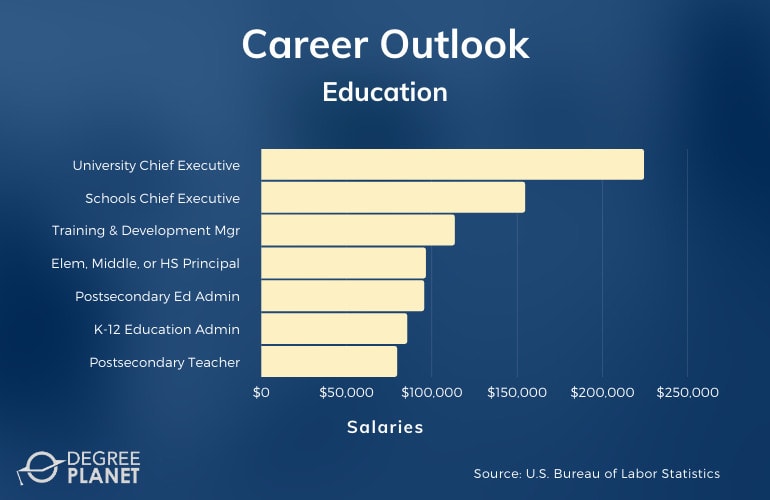Is an Ed.D. worth it? If you’re an educator with a passion for teaching and learning, you may be considering a Doctor of Education program.

Editorial Listing ShortCode:
Do you see yourself as an educational leader with fresh ideas and a desire to make advancements in curriculum and policies? Perhaps you’d like to develop your career to make a positive impact in the field of education. If these ideas resonate with you, then you might be ready to start working toward your Ed.D.
Is an Ed.D. Worth it?

Yes, an Ed.D. is worth it for many students. The Bureau of Labor Statistics is projecting 5% job growth in education, training, and library occupations over the next 10 years.
Common Doctor of Education careers in this field include elementary, middle, and high school principal, instructional coordinator, postsecondary education administrator, professor, and training and development specialist.
As you explore whether an Ed.D. is worthwhile, keep in mind that this is a subjective question. A lot depends on your personal goals and interests. But, before you start on a doctoral degree program, investigating whether the Ed.D. salary will be sufficient to make the expense of a Doctor of Education worth it can help you decide.
With an Ed.D., you may position yourself to step into educational leadership positions. This career pathway may allow you to impact educational policy and curriculum.
Editorial Listing ShortCode:
With an Ed.D., you might work in public or private schools that provide instruction for students from pre-kindergarten through high school. Working for schools or school systems, you might be a principal, a curriculum specialist, a supervisor and mentor for teachers, or an administrator overseeing the operations of the educational organization.
If your interests lie in the direction of postsecondary education, you might develop your career within a university or community college environment. With the Ed.D., you might assume the role of an administrator who oversees the operations of the institution. Or, you may want to pursue teaching and research on the college level.
If you would prefer to work in the environment of business and industry, an Ed.D. may launch your career as a trainer for employees. In this exciting role, you could design and administer educational opportunities for employees in businesses and industries.
Your contributions could help workers improve and diversify their skills to keep up with the rapidly advancing challenges of the workplace.
How to Decide Whether a Doctorate in Education is Right for You

If you’re investigating whether a Doctor of Education is worth it, you’re probably already working as an educator. You probably already hold bachelor’s and master’s degrees in education, along with licensure in your state. In your chosen field, you’re already pursuing a gratifying career.
But perhaps you’re feeling restless and ready to take your career to the next level. Maybe you’re motivated to step into leadership positions in education.
The Ed.D. is not a degree that simply prepares you for continued classroom teaching. In that way, it is not a teacher-training degree. Instead, it is designed to prepare you for administrative leadership roles or research and teaching on the college level.
Here are three reasons that might make a Doctor of Education worth it for you.
1. You’re a natural leader.

Do you notice that other teachers respect your work and come to you for advice? Perhaps you’ve already stepped into leadership roles as a head teacher or department chairperson.
If you enjoy the challenge of making decisions and leading others, you may be ready to develop your career as an administrator. Earning your Ed.D. can help you obtain the additional expertise and credibility you need to serve others through leadership.
2. You want to positively impact the field of education.
If you want to make a contribution to the lives of students, teachers, and the broader community, then becoming a leader in education may enable you to make a positive difference.
Education is a noble profession with profound opportunities for serving others. With an Ed.D., you may position yourself to be the person who makes impactful decisions and carries through with positive action.
3. You have a vision for the future of educational policy and curriculum.

In the world of education, professionals continually seek to improve the delivery of instruction. They work to improve school environments that optimize positive outcomes for students, parents, and teachers.
With an Ed.D., you may qualify to work in positions where policy decisions and curriculum choices are made. If you have a vision for the future of education, you may want to pursue the doctoral degree that could position you to realize that vision.
5 Things You Can Do with an EdD Degree
The Ed.D. is a versatile degree within the world of education. Earning this degree can help you develop marketable skills and expertise for a wide range of education careers.
Editorial Listing ShortCode:
It can help you prepare for jobs ranging from preschool education through university levels. These include school principal, instructional coordinator, college administrator or professor, or employee training specialist.
1. Elementary, Middle, or High School Principal

Principals of elementary, middle, and high schools are the top managers of their schools. They oversee all the activities (academic and extra-curricular) of teachers, students, and staff. They implement and maintain curricular standards, observe and evaluate instruction, and collaborate with parents and teachers.
Principals are also responsible for their schools’ security, budgets, and maintenance. In public schools, principals are responsible for carrying out educational mandates from state and local school boards. For those seeking this position, an Ed.D. or even an Ed.S. is worth it most of the time.
2. Instructional Coordinator

Instructional coordinators develop and implement curricula for public or private schools and school systems. They analyze data from student test scores to determine students’ academic needs.
Instructional coordinators assess and select textbooks and other teaching materials. Then, they organize and implement staff development training for teachers to carry out curricular goals.
Instructional coordinators plan and lead workshops and conferences for educators. They may serve as mentors or coaches for teachers who seek to improve their instructional skills.
3. Postsecondary Education Administrator

Postsecondary education administrators work in colleges and universities, junior colleges, and community colleges. These administrators are responsible for the operations of their institutions, and they work in all departments. A postsecondary education administrator may fill the role of admissions officer, registrar, or dean of student affairs.
Other postsecondary administrative jobs include provost (chief academic officer) or academic dean. Deans coordinate the activities of departments or colleges within a larger university structure. Their duties include overseeing faculty research activities.
4. Postsecondary Teacher (College Professor)

Postsecondary teachers provide direct instruction for the students in colleges, universities, junior colleges, and community colleges. They may teach online courses or face-to-face classes as well as supervising student research and internships. Outside of class time, these teachers meet with students for advising, mentoring, and tutoring.
Additionally, postsecondary teachers engage in research in their respective fields. They are responsible for communicating their research findings through writing books and articles as well as making public presentations.
5. Training and Development Specialist (Business and Industry)

Unlike the other careers described in this list, training and development specialists do not work in K-12 or postsecondary schools or colleges. Instead, these educators work in businesses and industries to provide necessary educational and training opportunities for employees.
Training and development specialists develop, implement, and evaluate on-the-job training programs that help employees to meet the demands of ever-changing businesses and industries.
Doctorate in Education Degree Alternatives
Before you finalize your decision to work on an Ed.D. degree, you may want to explore similar, alternative degrees in education online or on campus.
Editorial Listing ShortCode:
Here’s a summary of three possible alternatives.
- PhD in Education. If you’re interested in conducting research and/or becoming a college professor, then a Ph.D. might be right for you. It is known as preparation for professional work in academia.
- Doctor of Educational Leadership. The Doctor of Educational Leadership is a practitioner degree. This degree program focuses on developing leadership skills for administrative positions in K-12 school systems, military settings, and corporations. Dissertations usually focus on finding solutions to problems.
- PhD in Curriculum and Instruction. This degree focuses on new research to find the most effective instructional methods and materials to enhance student achievement. The Ph.D. candidate conducts research, analyzes data, and reports findings in a dissertation.
All three of these terminal degrees overlap with each other, and they may open doors to similar career pathways.
Education Careers & Salaries

Educators who complete the Ed.D. degree often move into administrative or supervisory positions within K-12 school systems, colleges and universities, or the employee training divisions of businesses and industries.
According to the Bureau of Labor Statistics, the following table shows the median Ed.D. salary for ten careers that are frequently pursued by educators with Ed.D. degrees.
| Careers | Annual Median Salaries |
| University Chief Executive | $208,000 |
| Elementary and Secondary Schools Chief Executive | $192,370 |
| Training and Development Manager | $115,640 |
| Local Elementary, Middle, or High School Principal | $99,690 |
| Postsecondary Education Administrator | $97,500 |
| Private K-12 Education Administrator | $89,350 |
| Postsecondary Teacher (College Professor) | $80,790 |
| Social and Community Service Manager | $69,600 |
| Instructional Coordinator | $66,970 |
| Training and Development Specialist | $62,700 |
The future outlook for the careers listed here is positive. The Bureau of Labor Statistics projects above average job growth (approximately 5%) for these jobs throughout the current decade.
What’s the Difference Between an EdD and a PhD?

An Ed.D. is known as the post-graduate degree for practitioners in the field of education. The Ph.D. is known as the post-graduate degree for researchers and academics in the field of education.
In general, practitioners with the Ed.D. might work as K-12 school administrators or serve in supervisory positions for public or private school systems and universities. On the other hand, those with the Ph.D. degree in education might become university professors and engage in education research and writing.
Editorial Listing ShortCode:
The overlap for these two degrees is substantial, however. There are no hard and fast rules about the career you might enter with the Ed.D. or the Ph.D. degree.
How Long Does It Take to Get a Doctorate in Education?

The length of time it will take you to complete your Ed.D. depends on your circumstances and how much time you’re able to put into taking classes. If you’re able to enroll full-time every semester, you may be able to finish in about 2 years.
Most educators working on the Ed.D. are currently employed in the field of education and unable to fulfill their professional responsibilities while enrolling fulltime in graduate school.
For those who enroll part-time, the projected timeline to graduation is typically 2 to 5 years. Some may take as many as 7 years to complete an Ed.D. degree program.
Getting Your Doctorate in Education Online

Just as when earning an online masters in education, many people who earn their Ed.D. degrees do so while working in full-time careers as educators. With an online degree program, it’s possible to balance professional and family responsibilities while you complete your coursework, research, and dissertation.
Once you decide that the Ed.D. is the right degree for you, there is a plethora of available, online degree programs to research. Of course, looking for an accredited degree program from a regionally accredited university is important as well.
Additionally, you may consider cost, financial aid, faculty, course offerings, and opportunities to perform research and specialize in areas that interest you. Now might be just the right time to launch your next educational adventure!

